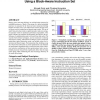Free Online Productivity Tools
i2Speak
i2Symbol
i2OCR
iTex2Img
iWeb2Print
iWeb2Shot
i2Type
iPdf2Split
iPdf2Merge
i2Bopomofo
i2Arabic
i2Style
i2Image
i2PDF
iLatex2Rtf
Sci2ools
114
click to vote
CASES
2007
ACM
2007
ACM
A low power front-end for embedded processors using a block-aware instruction set
Energy, power, and area efficiency are critical design concerns for embedded processors. Much of the energy of a typical embedded processor is consumed in the front-end since instruction fetching happens on nearly every cycle and involves accesses to large memory arrays such as instruction and branch target caches. The use of small front-end arrays leads to significant power and area savings, but typically results in significant performance degradation. This paper evaluates and compares optimizations that improve the performance of embedded processors with small front-end caches. We examine both software techniques, such as instruction re-ordering and selective caching, and hardware techniques, such as instruction prefetching, tagless instruction cache, and unified caches for instruction and branch targets. We demonstrate that, building on top of a block-aware instruction set, these optimizations can eliminate the performance degradation due to small front-end caches. Moreover, select...
Related Content
| Added | 12 Aug 2010 |
| Updated | 12 Aug 2010 |
| Type | Conference |
| Year | 2007 |
| Where | CASES |
| Authors | Ahmad Zmily, Christos Kozyrakis |
Comments (0)

